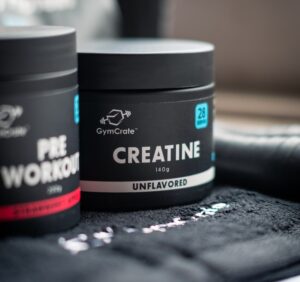
Guide to Scientifically-Backed Supplements
Not all supplements are backed by scientific research. This guide will tell you more about four of the most researched sports supplements and active ingredients: whey protein, creatine monohydrate, beta-alanine, and caffeine.
Science-backed supplements
The field of sports nutrition is constantly growing, with new products emerging all the time, and science is trying to keep pace. There were 2082 research articles tagged “sport nutrition” in 2017 alone, according to the JISSN. https://www.ncbi.nlm.nih.gov/pmc/articles/PMC6090881/
However, this does not mean that all sports supplement ingredients, formulas, and products are endorsed by research. In fact, very few sports supplements have received the backing of science.
In the International Society of Sports Nutrition’s (ISSN) exercise and sports nutrition review update of 2017, the society noted that:
“Use of a limited number of nutritional supplements that research has supported to improve energy availability (e.g., sports drinks, carbohydrate, creatine, caffeine, β-alanine, etc.) and/or promote recovery (carbohydrate, protein, essential amino acids, etc.) can provide additional benefit in certain instances.”
This guide will explore key sports supplement ingredients that have been proven by science to improve energy availability or promote recovery.
Protein powder
Protein is an important macronutrient for building muscle, retaining lean tissue, and gaining strength. The trouble is, it’s difficult to get all of your protein from whole foods like meat, fish, eggs, and dairy. A good quality protein powder is a convenient and cost-effective way to meet your protein needs as an active individual.
Whey protein powder is the most bioavailable type of protein powder (which means how well your body uses a specific type of protein) and contains all of the essential amino acids including all 3 Branched-Chain Amino Acids (BCAAs). Our whey protein powder combines whey protein concentrate (WPC) and whey protein isolate (WPI) so the product benefits from having higher protein levels while retaining a good taste profile.
You can read more about the benefits of whey protein here.
The effects of whey protein powder on muscle recovery and growth
In 2017, a double-blind crossover study was carried out into the effect of whey protein supplementation on whole-body protein metabolism and performance recovery after resistance exercise. The study concluded that 25g of whey protein after resistance training improved net protein balance, and was associated with enhanced recovery and therefore muscle growth. https://www.ncbi.nlm.nih.gov/pmc/articles/PMC5537849/
Creatine monohydrate
Creatine is a simple and cost-effective supplement that can have a significant impact on your training output, power, strength, and muscle gain. Creatine is taken by a huge number of gym-goers and athletes all over the world and is supported by scientific research across thousands of studies.
Creatine is a natural substance that works by increasing the body’s levels of ATP, a kind of powerhouse for muscles. This means you will be able to perform at a higher level, in short, intense workouts like lifting weights, HIIT, or team sports.
Creatine is also known to help you get a better muscle pump which will, in turn, help you build muscle mass.
Scientific research into creatine
In 2021, the Journal of the International Society of Sports Nutrition published a paper looking at common questions and misconceptions around creatine supplementation. This paper concluded that creatine is safe, has little to no known side effects, and can be beneficial for a variety of athletic activities. It also noted that other forms of creatine are not superior to creatine monohydrate. https://www.ncbi.nlm.nih.gov/pmc/articles/PMC7871530/.
When it comes to the performance increase, a 2012 article titled in the National Center for Biotechnology Information concluded that creatine supplementation over an extended period (ensuring complete saturation of creatine stores combined with training) can result in a variety of benefits. Some of these benefits include “…amplifying the effects of resistance training for enhancing strength and hypertrophy, improving the quality and benefits of high-intensity intermittent speed training, improving aerobic endurance performance in trials lasting more than 150s, and positive effects on strength, power, fat-free mass, daily living performance and neurological function in young and older people…”. It is important to note that if creatine stores are not saturated, these results may vary, which is why it is essential to consume a consistent amount of creatine to replenish these stores frequently.
Our recommendation is a 5-7 gram dose every day, which allows for most individuals to reach their saturation point.
Beta-alanine
Beta-alanine is one of the ingredients in our pre-workout, and we chose it precisely because it is backed by science. Beta-alanine is an amino acid that produces carnosine in muscle tissue which helps buffer lactic acid so you can train harder. It is also backed by the Australian Institute of Sports stating that “numerous studies have demonstrated substantial increases in muscle carnosine in responses to a variety of beta-alanine supplementation protocols…for periods ranging from 4-24 weeks…and supplementation protocols over this period appear to be safe”.
The science of beta-alanine
A meta-analysis was published in 2012 which looked at the effects of beta-alanine supplementation on sports performance. The paper found that beta-alanine supplementation elicits a significant ergogenic effect on high-intensity exercise, particularly where the exercise lasts between 1-4 minutes (which is the typical period for each set).
Caffeine
If you enjoy coffee, you won’t be surprised to know that the active ingredient of caffeine has been scientifically proven to provide many benefits. We use it in our pre-workout for its impact on mood, energy, alertness, and focus and for its ability to lower your perceived rate of exertion.
Caffeine works by blocking adenosine receptors, stimulating the central nervous system, and upregulating neurotransmitter activity. This in turn can result in an increased performance capacity and improve a training session dramatically.
The science of caffeine in sports supplements
Caffeine has a high level of scientific evidence supporting its impact on sports performance. In 2020, the JISSN published a paper that looked at the effects of caffeine supplementation on physical performance and mood. It concluded that supplementing with caffeine has an ergogenic effect on anaerobic performance, improves average power and peak power and the time needed to reach peak power and that these improvements happen while reducing the feeling of fatigue.
https://www.ncbi.nlm.nih.gov/pmc/articles/PMC6942320/
By consuming caffeine in conjunction with beta-alanine, the feelings of fatigue can be overcome significantly, resulting in a better quality workout and improved performance.
Why don’t we offer BCAAs?
You may wonder why we don’t offer BCAA supplements at GymCrate. After all, almost every other supplement company does. The reason is simple – and science-backed. BCAAs are amino acids, and a good quality protein powder already covers all your bases by including enough amino acids. Our whey protein powder has plenty of BCAAs (and other amino acids). You simply don’t need to take separate BCAAs if you are using our protein powder. It would be a waste of your money.






